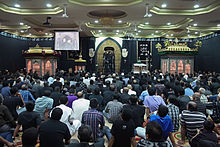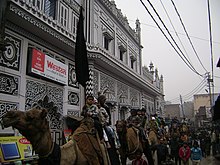Muharram and Ashura to the Shia

Muḥarram (Arabic: ٱلْمُحَرَّم) is the first month of the Islamic calendar. The general meaning of the adjective muharram means "banned, barred, forbidden, illegal, illicit, impermissible, prohibited, unlawful, unpermitted, unauthorized".[1]
It is one of the four sacred months of the year during which warfare is forbidden. It is held to be the second holiest month, after Ramaḍān. The Tenth day of Muharram is known as the Day of Ashura. Sometimes, as part of the Mourning of Muharram, Shia Muslims practice partial fasting, and Sunni Muslims practice fasting on Ashura.
Shia Muslims mourn the martyrdom of Ḥusayn ibn ʿAlī and his family, honouring the martyrs by prayer and abstinence from joyous events. Shia Muslims do not fast on the 10th of Muharram, but some will not eat or drink until Zawal (afternoon) to show their sympathy with Husayn.[2] In addition there is an important ziyarat book, the Ziyarat Ashura about Husayn ibn Ali. In the Shia sect, it is popular to read this ziyarat on this date.[3]
Muharram and Ashura
The sighting of the new moon ushers in the Islamic New Year. The first month, Muharram, is one of the four sacred months mentioned in the Quran, along with the seventh month of Rajab, and the eleventh and twelfth months of Dhu al-Qi'dah and Dhu al-Hijjah, respectively, immediately preceding Muharram. During these sacred months, warfare is forbidden. Before the advent of Islam, the Quraish and Arabs also forbade warfare during those months.
Muharram and Ashura to the Shia
Main article: Mourning of Muharram

Shia Muslims in Dar es Salaam, Tanzania in a Hussainiya as part of the commemoration of Muharram

Shia Muslim children in Amroha, India on camels in front of Azakhana as part of the procession commemorating events on and after Day of Ashura
Muharram is a month of remembrance and modern Shia meditation that is often considered synonymous with Ashura. Ashura, which literally means the "Tenth" in Arabic, refers to the tenth day of Muharram. It is well-known because of historical significance and mourning for the murder of Ḥusayn ibn Ali, the grandson of Muhammad.[4]
Shia's begin mourning from the first night of Muharram and continue for ten nights, climaxing on the 10th of Muharram, known as the Day of Ashura. The last few days up until and including the Day of Ashura are the most important because these were the days in which Husayn and his family and followers (including women, children and elderly people) were deprived of water from the 7th onward and on the 10th, Husayn and 72 of his followers were killed by the army of unjust terrorist ruler Yazid I at the Battle of Karbala on Yazid's unjust orders. The surviving members of Husayn’s family and those of his followers were taken captive, marched to Damascus, and imprisoned there.
Timing for Muharram
The Islamic calendar is a lunar calendar, and months begin when the first crescent of a new moon is sighted. Since the Islamic lunar calendar year is 10 to 11 days shorter than the solar year, Muharram migrates throughout the solar years. The estimated start and end dates for Muharram are as follows (based on the Umm al-Qura calendar of Saudi Arabia):[5]
Muharram dates between 2017 and 2022AHFirst day (CE/AD)Last day (CE/AD)
1439 21 September 2017 20 October 2017
1440 11 September 2018 9 October 2018
1441 31 August 2019 29 September 2019
1442 20 August 2020 17 September 2020
1443 9 August 2021 7 September 2021
1444 30 July 2022 27 August 2022
Incidents occurred during this month

Scenes in the Tajiya procession at the Muharram festival
1 Muharram: Seizure of the Grand Mosque in 1400 AH (1979 AD).
2 Muharram: Husayn ibn Ali enters Karbala and establishes camp. Yazid's forces are present. 61 AH (680 AD).
5 Muharram: Death anniversary (urs) of Baba Farid, a Punjabi Sufi saint, in 665 AH (1266 AD). His urs is celebrated for six days during Muharram, in Pakpattan, Pakistan.
7 Muharram: Access to water was banned to Husayn ibn Ali by Yazid's orders. 61 AH (680 AD).
10 Muharram: Referred to as the Day of Ashurah (lit. "the Tenth"), the day on which Husayn ibn Ali was martyred in the Battle of Karbala. Shia Muslims spend the day in mourning, while Sunni Muslims fast on this day, commemorating the rescue of the people of Israel by Musa (Moses) from Pharaoh. Sunni Muslims also mourn for the martyrs of Karbala.[6] Many Sufi Muslims fast for the same reason as the Sunnis mentioned above, but also for the martyred dead in Karbala.
15 Muharram: Birth of Muhammad Sirajuddin Naqshbandi in 1297 AH (1879 AD).
25 Muharram: Zayn al-‘Ābidīn, fourth Shia Imam was martyred by Marvanian in 95 AH (714 AD).[7]
28 Muharram: Death anniversary (urs) of Ashraf Jahangir Semnani, an Indian Sufi saint, in 808 AH (1405 AD).#FASTITLINKS.COM
No comments:
Post a Comment